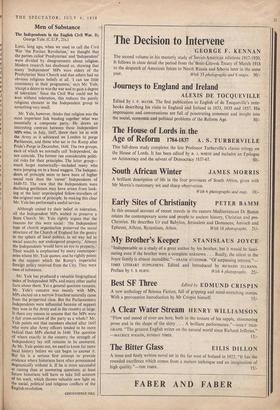Men of Substance
LONG, long ago, when we used to call the Civil War 'the Puritan Revolution,' we thought that the parties called 'Presbyterian' and 'Independent' were divided by disagreements about religion. Modern research has disabused us, showing that many 'Independent' MPs were elders of the Presbyterian State Church and that others had no obvious religious beliefs at all. 'I can see little consistency in their programme,' says Mr. Yule, 'except a desire to win the war and to gain a degree of toleration.' Since the Civil War could not be won without toleration, this reduces the purely religious element in the Independent group to something very small.
Mr. Yule, however, thinks that religion was the most important link binding together what was -essentially a composite party. He draws an interesting contrast between those Independent MPs who, in July, 1647, threw their lot in with the Army as it advanced on London to purge Parliament, and those who sat in the Rump after Pride's Purge in December, 1648. The two groups, each of which we normally call 'Independent,' do not coincide. The former ran considerable politi- cal risks for their principles. The latter group— much larger numerically—included many who were jumping on to a band waggon. The Indepen- dents of principle seem to have been of higher social rank than the 'career' Independents of 1649-53. The view that the Independents were declining gentlemen may have arisen from look- ing at the later unprincipled fellow-travellers of the original men of principle. In making this clear Mr. Yule has performed a useful service.
Although united by their belief in toleration, all the Independent MPs wished to preserve a State Church. Mr. Yule rightly argues that the reasons for this were social : 'the Independent type of church organisation preserved the social structure of the Church of England for the gentry in the sphere of local politics, in no way led to social anarchy nor endangered property.' Always the Independents 'would have an eye to property.' Their wealth is emphasised by many contempor- aries whom Mr. Yule quotes; and he rightly points to the support which the Rump's imperialist foreign poliey received from the City. They were men of substance.
Mr. Yule has produced a valuable biographical index of Independent MPs, and many other useful facts about them. Yet a general question remains. Mr. Yule's concern was mainly with MPs. MPs elected on a narrow franchise' naturally came from the propertied class. But the Parliamentary Independents were influential because of support they won in the Army and in the country at large. Is there any reason to assume that the MPs were a fair cross-section of the party as a whole? Mr. Yule points out that members elected after 1645 Who were also Army officers tended to be more radical than MPs elected in 1640. The question of where exactly in the country the strength of Independency lay still remains to be answered. As Mr. Yule points out, we need to know far more local history before we can begin to answer it. But his is a serious first attempt to provide evidence where historians have often pronounced dogmatically without it. If he is more successful at raising than at answering questions, at least future historians will have to take full account of his work, which throws valuable new light on the social, political and religious conflicts of the English revolution.
CHRISTOPHER HILL






















































 Previous page
Previous page